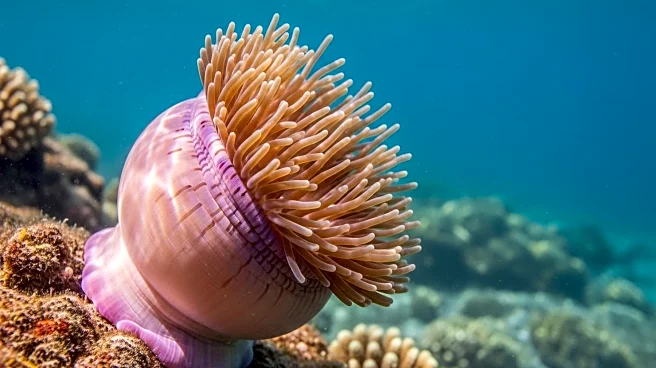What's Happening?
Researchers are exploring the regenerative capabilities of the starlet sea anemone, a marine creature found along the U.S. and British coasts, which may hold the key to significantly extending human life. The starlet sea anemone, known scientifically as Nematostella vectensis, possesses extraordinary regenerative abilities, allowing it to regenerate entire body parts and potentially bypass the aging process. This species is part of the Cnidaria group, which includes jellyfish known for their regenerative capabilities. Recent studies have identified multipotent stem cells in the sea anemone, which enable it to produce specialized cells endlessly. These findings, published in Science Advances, suggest that the sea anemone's regenerative abilities could be harnessed to advance human anti-aging research.
Why It's Important?
The discovery of the starlet sea anemone's regenerative capabilities could revolutionize anti-aging research and medicine. If scientists can understand and replicate the mechanisms behind the anemone's ability to regenerate and remain youthful, it could lead to breakthroughs in human health and longevity. This research has the potential to impact industries focused on healthcare, biotechnology, and pharmaceuticals, offering new avenues for developing treatments that slow down or reverse aging. The ability to harness multipotent stem cells for regenerative purposes could also lead to advancements in healing injuries and regenerating human organs, significantly improving quality of life and healthcare outcomes.
What's Next?
Researchers are likely to continue studying the genetic and cellular mechanisms that enable the starlet sea anemone's regenerative abilities. The focus will be on understanding the role of specific genes, such as nanos and piwi, which are crucial in stem cell differentiation and gametogenesis. Further exploration using technologies like CRISPR to manipulate these genes could provide deeper insights into the biological processes that contribute to the anemone's immortality. As research progresses, collaborations between scientific institutions and biotechnology companies may emerge to develop practical applications for human anti-aging treatments.
Beyond the Headlines
The ethical implications of extending human life through regenerative medicine are significant. Questions about the societal impact of increased longevity, resource allocation, and the potential for inequality in access to anti-aging treatments will need to be addressed. Additionally, the research into the starlet sea anemone's regenerative capabilities may lead to broader discussions about the conservation of marine biodiversity and the importance of preserving species that could hold keys to scientific advancements.








